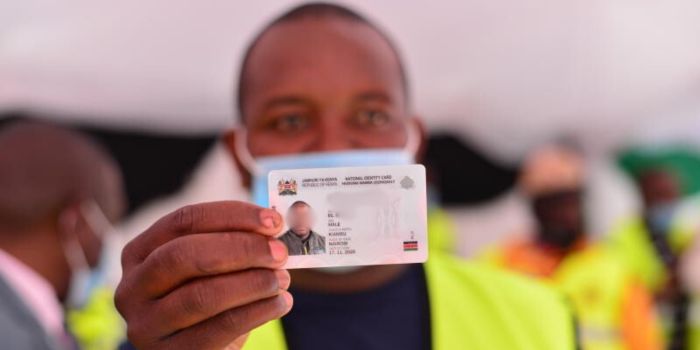Government kicks off public participation in Maisha card legislation

The meeting with NGAO was also used to fine-tune communication around contentious issues surrounding the shift to Maisha cards including their set expiratiion after every 10 years.
The government has launched a countrywide awareness campaign on proposed regulations to govern the issuance of new national ID cards and birth and death certificates.
Regional and national commissioners will coordinate the exercise on the draft regulations for the Registration of Persons Amendment Rules 2024 and the Birth and Death Registration Amendment Rules 2024, which will commence next week.
More To Read
- Huduma Kenya admits national ID system downtime as frustrated youths protest delays, citing job losses
- Kenyan students to get National IDs and be registered as voters automatically at 18 under new Bill
- Ruto waives ID replacement fees until after 2027 polls to boost voter registration
- Government scraps birth certificate authentication fees for IDs, passports
- Government launches national ID registration for 18-year-old secondary school students
- Lamu records highest increase in ID card applications as border regions see surge
The regulations are critical in anchoring the rollout of the Maisha card and its related features including the virtual ID that the government has been piloting since November last year.
Speaking after chairing a meeting with regional and county commissioners to plan the rollout of the exercise, Immigration PS Julius Bitok said the government was aiming at extensive and interactive forums to enrich the draft regulations.
He assured the public that their feedback on the draft regulations would be taken seriously, as the government intends to avoid the pitfalls that have hampered previous attempts to issue new ID cards in the country.
"Public participation is not merely a procedural obligation but a fundamental aspect of our democratic system. It presents a unique opportunity to dispel misconceptions about Maisha Namba and Maisha Card, ensuring that citizens grasp the benefits and scope of these initiatives," said the PS a day after confirming that the Maisha Namba will be voluntary to all.
The planned forums are a continuation of similar ones held with other stakeholders and interest groups.
"Over the past year, we have conducted 800 public engagement exercises, and we will continue until every Kenyan comprehends and embraces the Maisha Namba system," he said.
The meeting with NGAO was also used to fine-tune communication around contentious issues surrounding the shift to Maisha cards including their set expiratiion after every 10 years.
The PS, again clarified that the expiry of a Maisha Card will not amount to a loss of citizenship, with the bearer only required to renew the document.
Prof Bitok further defended the revised fees for acquiring or replacing the Maisha card, saying they were highly subsidised as the cost of producing the Maisha card was high due to its superior features.
Top Stories Today
















































